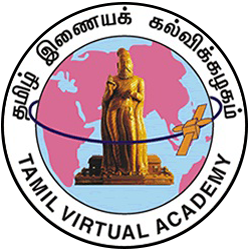Primary tabs
- P10315 Namakkal Ramalingam Pillai
This lesson discusses the works of Namakkal Ramalingam Pillai, a renowned Tamil poet. Namakkal Ramalingam Pillai, fondly remembered as Nammakal Kavingar, has carved a niche for himself in Tamil literature. Born in 1888, Namakkal Kavingar was the eighth child of a large family. Even as a child he displayed a keen interest in learning and despite the impoverished conditions in which he was brought up, he grew up into an intelligent, versatile young man. He was not only a great poet but also an accomplished novelist and essayist. It must be mentioned that this multi-faceted poet was a talented artist too. An ardent nationalist, he upheld Gandhian thoughts and principles throughout his life. A prolific writer, Namakkal Kavingar has a number of works to his credit. "Desabakthi Paadalgal", "Tamilan Idhayam", "Gandhi Anjali", "Kavithanjali", "Tamil Manam" are some of his important works.Namakkal Kavingar was a great admirer of Mahatma Gandhi. During the famous salt sathyagraha march to Vedharanyam, Namakkal Kavingar wrote an inspiring poem that was recited by thousands who participated in the non-violent march. Ahimsa ie., (Non-violence), Truth, untouchability, prohibition of alcohol were issues central to Gandhian thought and Namakkal Kavingar addressed them time and again in his poems.
Namakkal Kavingar also played an active role in politics. He worked as the Secretary of the Congress Committee from 1921 to 1930. He gave inspiring speeches at the committee meetings and wrote poems that promoted the nationalistic spirit among the people. He underwent one year imprisonment for his political activities in 1932.
A recurring theme in Namakkal Kavingar's poetry is the beauty and grandeur of the Tamil language. While celebrating the glory of Tamil Literature, he declares that the works of Thiruvalluvar and Barathiyaar have greatly enriched the Tamil language.
As a poet who wrote with a social consciousness, Namakkal Kavingar voiced the concerns of the working class. Like many other poets of his time he condemned the exploitation of the poor by the rich. He also championed the cause of women.


